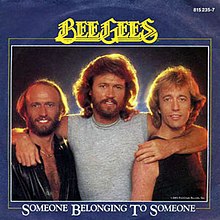
The Bee Gees were a musical group formed in 1958 by brothers Barry, Robin, and Maurice Gibb. The trio were especially successful in popular music in the late 1960s and early 1970s, and later as prominent performers in the disco music era in the mid- to late 1970s.

Robin Hugh Gibb was a British singer and songwriter. He gained worldwide fame as a member of the Bee Gees with elder brother Barry and fraternal twin brother Maurice. Robin Gibb also had his own successful solo career. Their youngest brother Andy was also a singer.

Maurice Ernest Gibb was a British musician. He achieved worldwide fame as a member of the pop group Bee Gees. Although his elder brother Barry Gibb and fraternal twin brother Robin Gibb were the group's main lead singers, most of their albums included at least one or two songs featuring Maurice's lead vocals, including "Lay It on Me", "Country Woman" and "On Time". The Bee Gees are one of the most successful pop-rock groups of all time.

Sir Barry Alan Crompton Gibb is a British musician, singer, songwriter and record producer. He rose to worldwide fame as a member of the Bee Gees, with his younger brothers, Robin and Maurice, one of the most commercially successful groups in the history of popular music. Gibb's career has spanned over 60 years.

Cucumber Castle is the seventh studio album by the Bee Gees, released in April 1970. It was produced by Barry Gibb, Maurice Gibb, and Robert Stigwood. It consists of songs from their television special of the same name, which was named after a song on their 1967 album Bee Gees' 1st. Cucumber Castle is the only Bee Gees album not to feature any recorded contributions from Robin Gibb, as he had left the group before the album was recorded.

Size Isn't Everything is the twentieth studio album by the Bee Gees, released in the UK on 13 September 1993, and the US on 2 November of the same year. The brothers abandoned the contemporary dance feel of the previous album High Civilization and went for what they would describe as "A return to our sound before Saturday Night Fever".
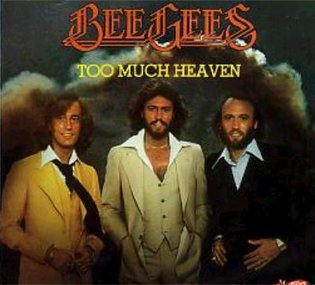
"Too Much Heaven" is a song by the Bee Gees, which was the band's contribution to the "Music for UNICEF" fund. They performed it at the Music for UNICEF Concert on 9 January 1979. The song later found its way to the group's thirteenth original album, Spirits Having Flown. It hit No. 1 in both the US and Canada. In the United States, the song was the first single out of three from the album to interrupt a song's stay at #1. "Too Much Heaven" knocked "Le Freak" off the top spot for two weeks before "Le Freak" returned to #1 again. "Too Much Heaven" also rose to the top three in the UK. In the US, it would become the fourth of six consecutive No. 1s, equalling the record set by Bing Crosby, Elvis Presley, and the Beatles for the most consecutive No. 1 songs. The six Bee Gee songs are "How Deep Is Your Love", "Stayin' Alive", "Night Fever", "Too Much Heaven", "Tragedy" and "Love You Inside Out". The songs spanned the years of 1977, 1978 and 1979.

Spirits Having Flown is the fifteenth album by the Bee Gees, released in 1979 by RSO Records. It was the group's first album after their collaboration on the Saturday Night Fever soundtrack. The album's first three tracks were released as singles and all reached No. 1 in the US, giving the Bee Gees an unbroken run of six US chart-toppers in a one-year period and equaling a feat shared by Bing Crosby, Elvis Presley, and The Beatles. It was the first Bee Gees album to make the UK top 40 in ten years, as well as being their first and only UK No. 1 album. Spirits Having Flown also topped the charts in Australia, Canada, Germany, New Zealand, Sweden and the US. The album has sold more than 20 million copies worldwide.

"I Could Not Love You More" is a song by the Bee Gees from their twenty-first studio album, Still Waters, released in 1997 as the album's second single. The song is a pop ballad written by Barry, Robin and Maurice Gibb and recorded in Los Angeles in March 1996. The track was produced by the Gibb brothers and David Foster. The track was a moderate hit worldwide, peaking at #14 in the UK and appearing in serious charts all over Europe.

To Whom It May Concern is the tenth album by the Bee Gees. Released in October 1972, it is the follow-up to, and continues the melancholic and personal sound of its predecessor, Trafalgar. The album was recognised as "a farewell to the old Bee Gees" as the album marked the end of an era for the group in several ways: it was their last album to be recorded solely at IBC Studios, in London, their last with conductor and arranger Bill Shepherd, who had guided them since 1967, and their last under their first contract with Robert Stigwood. Some of the songs were old ones finished or rewritten for the occasion.

"How Deep Is Your Love" is a pop ballad written and recorded by the Bee Gees in 1977 and released as a single in September of that year. It was ultimately used as part of the soundtrack to the film Saturday Night Fever. It was a number-three hit in the United Kingdom and Australia. In the United States, it topped the Billboard Hot 100 on 25 December 1977 and stayed in the Top 10 for 17 weeks. It spent six weeks atop the US adult contemporary chart. It is listed at No. 27 on Billboard's All Time Top 100. Alongside "Stayin' Alive" and "Night Fever", it is one of the group's three tracks on the list. The song was covered by Take That for their 1996 Greatest Hits album, reaching No. 1 on the UK Singles Chart for three weeks.

"How Can You Mend a Broken Heart" is a song released by the Bee Gees in 1971. It was written by Barry and Robin Gibb and was the first single on the group's 1971 album Trafalgar. It was their first US No. 1 single and also reached No. 1 in Cashbox magazine for two weeks.
"If I Can't Have You" is a disco song written by the Bee Gees in 1977. The song initially appeared on the Saturday Night Fever soundtrack in a version by Yvonne Elliman, released in November 1977. The Bee Gees' own version appeared a month later as the B-side of "Stayin' Alive".

"First of May" is a song by the Bee Gees with lead vocals by Barry Gibb, released as a single from their 1969 double album Odessa. Its B-side was "Lamplight". It also featured as the B-side of "Melody Fair" when that song was released as a single in the Far East in 1971 as well as in 1976 and 1980 on RSO Records. It was the first Bee Gees single to be released after lead guitarist Vince Melouney had left the group.
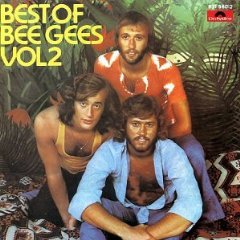
Best of Bee Gees Vol. 2 is a compilation album of hits by the Bee Gees released in 1973. The album, briefly revived on CD in the late 1980s, went out of print, but was reissued by Rhino in November 2008.
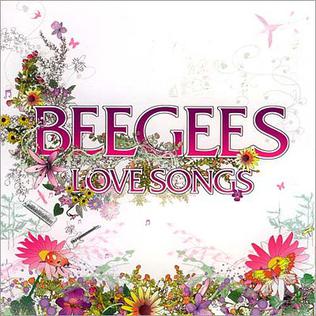
Love Songs is the Bee Gees' third compilation album in four years, though the first to cover a specific musical style. A proposed album of love songs was in the works around 1995 when the Bee Gees recorded their own versions of "Heartbreaker" and "Emotion", but that project was soon shelved and those recordings remained unavailable until the release of Their Greatest Hits: The Record in 2001.
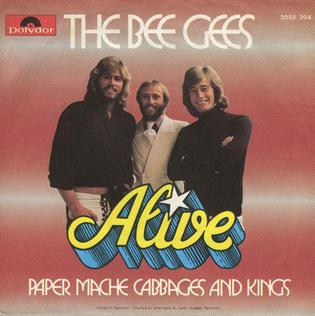
"Alive" is a ballad recorded by the Bee Gees for their album To Whom It May Concern. It was the second and last single from the album released on 10 November 1972 worldwide. The song was credited to Barry and Maurice Gibb and produced by the Gibbs and their manager Robert Stigwood.

The Ultimate Bee Gees is a compilation album released to coincide with the 50th anniversary of the Bee Gees. Although the group did not start recording until 1963 on Festival Records in Australia, they began calling themselves the "Bee Gees" in 1959 after several name changes such as "Wee Johnny Hayes and the Bluecats", "The Rattlesnakes" and "BG's". Each disc is themed with the first containing more upbeat songs, called A Night Out, and the second containing slower songs and ballads, called A Night In, though the cover art does not distinguish this theme. Liner notes were written by Sir Tim Rice. This also marks the return of the 1970s era logo on an official Bee Gees release, which was last used on the Bee Gees' 1983 single "Someone Belonging to Someone".

How Old Are You? is the second solo album released by British singer Robin Gibb in 1983, thirteen years after his debut Robin's Reign in 1970. The album was not a great success in America and failed to chart in Britain but it did spawn an international hit in "Juliet" which topped the charts in Germany. The album reached No. 6 in Germany. The album was produced by Robin and Maurice Gibb with Dennis Bryon.
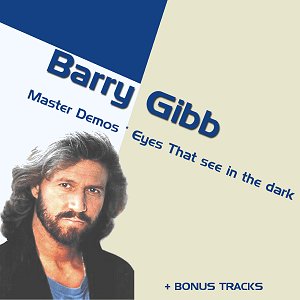
The Eyes That See in the Dark Demos is a demo version of the album by Barry Gibb. Originally circulating on tape among collectors and later also on CD the album saw a legitimate and wide release on iTunes in October 2006. Maurice Gibb contributed bass, guitar and synthesizer and Robin Gibb contributed background vocals on some songs in this demo album.
